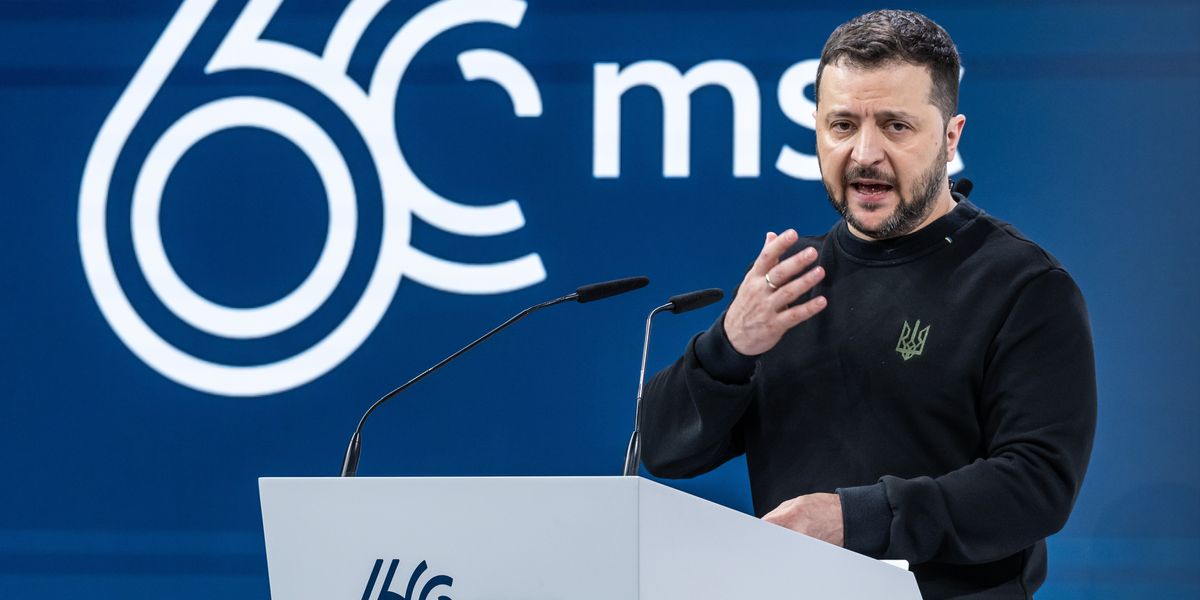MUNICH, GERMANY — If U.S. Vice President Kamala Harris dominated the first day of the Munich Security Conference with her remarks, today it was German Chancellor Olaf Scholz’s and Ukrainian President Volodymyr Zelensky’s turn.
It was not only Zelensky who understandably devoted his whole speech to the Ukraine War but also Scholz, too. The German Chancellor, while boasting that his country will devote 2% of its GDP to defense expenditures this year, remarked that “we Europeans need to do much more for our security now and in the future.”
In a brief but clear reference to Trump’s recent statements on NATO, Scholz said, "any relativization of NATO’s mutual defense guarantee will only benefit those who, just like Putin, want to weaken us.” On the guns and butter debate, which is particularly relevant in Germany due to negligible economic growth, Scholz acknowledged that critical voices are saying, “should not we be using the money for other things?” But he chose not to engage in this debate, noting instead that “Moscow is fanning the flames of such doubts with targeted disinformation campaigns and with propaganda on social media.”
Scholz was followed on the podium by Zelensky. They had already met on Friday, when the Ukrainian president signed separate security agreements with the French and German governments. The immediate context, however, was shaped by the news that Ukraine had ordered the complete withdrawal from the city of Avdiivka in eastern Ukraine before dawn on Saturday.
The Russian capture of the city represents the most significant defeat for Ukraine since the failure of its counter-offensive last year. On the loss of Avdiivka, Zelensky said that Ukraine had lost one soldier for every seven soldiers who have died on the Russian side. This, however, is difficult to reconcile with the reports about the rushed Ukrainian retreat, with a Ukrainian soldier explaining that “the road to Avdiivka is littered with our corpses.”
Throughout his speech, Zelensky repeatedly referred to the importance of defending what he called the “rules-based world order” by defeating Russia. If there was one take-away that Zelensky wanted impressed on this audience: “Please do not ask Ukraine when the war will end. Ask yourself why is Putin still able to continue it.”
He also seemed to suggest that it was not a lack of available weapons and artillery but a willingness to give them over to Ukraine. “Dear friends, unfortunately keeping Ukraine in the artificial deficit of weapons, particularly in deficit of artillery and long-range capabilities, allows Putin to adapt to the current intensity of the war,” Zelenskyy said. “The self-weakening of democracy over time undermines our joint results.”
The future of NATO was one of the main topics of the day. European leaders were in agreement that Europe needs to spend more on defense, and occasionally appeared to compete with each other on who has spent the most on weapons delivered to Ukraine or in their national defense budgets.
With NATO Secretary General Jens Stoltenberg in attendance, one of the panels featured two of the most talked-about names to replace the Norwegian politician in the 75th-anniversary summit in Washington in July: EU Commission President Ursula von der Leyen and caretaker Dutch Prime Minister Mark Rutte. According to a report by the German newspaper Welt am Sonntag, President Joseph Biden and his Secretary of State Anthony Blinken favor the German leader, but in Paris, London, and Berlin, the Dutch politician is preferred.
The participation of the Netherlands in the initial U.S.-UK joint strikes against Houthi positions in Yemen on Jan. 11 was read in some quarters as a sign of Rutte’s ambitions. The Netherlands was the only EU country to join these initial attacks.
A G7 meeting of foreign ministers also took place Saturday on the sidelines of the conference. In a press briefing that followed, Italian Foreign Minister Antonio Tajani — who currently presides the G7 — reiterated the group’s support for Ukraine. The current situation in the Red Sea, as is often the case in the West, was presented by Tajani as a topic divorced from the Gaza Strip. The Houthis started their campaign against ships in the Red Sea after the beginning of the war in Gaza, claiming they want to force an end to the conflict.
There is no certainty that the end of the war in Gaza would put an end to Houthi attacks, but presenting the situation in the Red Sea as being nothing but a threat to freedom of trade is considered by experts to be a a myopic approach.
Nevertheless, Italy will be in command of the new EU naval mission ASPIDES, to be deployed soon in the Red Sea. The mission is expected to be approved by the next meeting of EU foreign affairs ministers on Monday. When asked whether he could ensure that ASPIDES would remain a defensive mission, the Italian Foreign Minister said ASPIDES aims at defending merchant ships and that if drones or missiles are launched, they will be shot down, but no attacks will be conducted.
Marc Martorell Junyent is in Munich, covering the conference for Responsible Statecraft this weekend. This story is developing and is being updated.
- Zelensky: TIME may be on his side, but real time, isn't ›
- Dispatch from Munich: VP Harris warns against 'isolationism' ›
- Munich dispatch: Gaza "wind blowing against the West" | Responsible Statecraft ›
- The Ukraine War at 2 years: By the numbers | Responsible Statecraft ›














